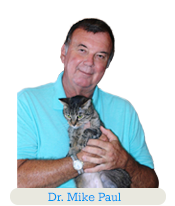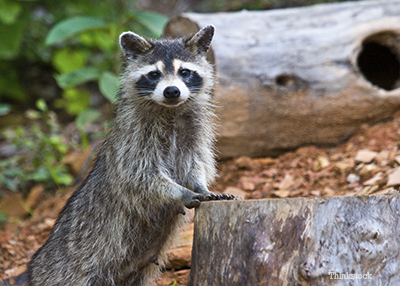
Most people are unaware that the cute little bandit that raids your trash and digs up grubs from your perfect lawn is likely also harboring a dangerous parasite. The parasite is called Baylisascaris (bā′lis•as′kä•ris), and the animal that carries it is the wily raccoon. Most animal species have their own set of parasites. Raccoon parasites are particularly concerning, in no small part because of Baylisascaris.
What is Baylisascaris?
It’s important to recognize that raccoons (like all wildlife) usually carry diseases, some of which are relevant concerns for both people and pets. One such concern to be aware of is Baylisascaris procyonis, also known as the raccoon roundworm. Baylisascaris procyonis is a common, large roundworm parasite that resides in the small intestine of the raccoon. This parasite can infect a variety of mammals including dogs and on occasion humans.
How is Baylisascaris transmitted?
Like so many intestinal parasites, infection occurs when the eggs of the worm are inadvertently ingested or when small, infected animals are eaten by raccoons. Infected raccoons can shed millions of eggs daily in their feces. These eggs become infective under proper conditions in about 10-14 days.
Where does this parasite occur?
Baylisascaris occurs wherever raccoons live. Infected raccoons have been found throughout the United States, though mainly in the Midwest, Northeast, Middle Atlantic, and West Coast.
How common is Baylisascaris in raccoons?
Prevalence of infections range to nearly 100% of all raccoons sampled depending on region and time of year, according to the Michigan Department of Natural Resources.
Can Baylisascaris spread to dogs?
Yes, Baylisascaris can spread to dogs, which can also increase the likelihood of human exposure. We don’t know how prevalent it is in dogs but because we do know it can be dangerous, we should always be on the lookout. Baylisascaris eggs look similar to dog roundworms so careful and critical identification is important.
What are the signs of Baylisascaris in dogs?
As with other roundworms, the mature worm lives in the intestines while the immature form migrates through the body of the puppy (see roundworm infections). There are two forms the disease can take in dogs:
- Intestinal, which is the typical adult form and like other intestinal parasites results in intestinal signs like diarrhea.
- Visceral, which is more common in puppies and is known to cause neurologic diseases that can mimic canine distemper, encephalitis and even rabies.
Can humans be infected by Baylisascaris?
Yes, human cases have been reported in several states, according to the CDC, resulting in serious consequences: California, Illinois, Louisiana, Massachusetts, Michigan, Minnesota, Missouri, New York, Oregon, and Pennsylvania have all had reports. In humans, pathological lesions observed consisted of skin irritations and eye and brain tissue damage due to the random migration of the larvae. As of 2012, there were 16 published human neurological cases in the US; six of the infected persons died.
Unfortunately, children are especially vulnerable because of their habit of putting objects which may be dirty or contaminated in their mouths.
Most infections are subclinical, meaning that they go undiagnosed. Diagnosis is difficult unless a person exhibits symptoms. Once an infection becomes advanced, current treatments are usually ineffective. Because a “cure” does not exist for the disease, prevention is the most effective means of controlling it. Though uncommon, the disease can result in irreversible brain damage.
Where are Baylisascaris eggs found?
Raccoons generally defecate in concentrated areas called latrines, where fecal material accumulates for weeks or years. Latrines are often located near dinning or feeding sites.
These latrines are commonly in areas where children and dogs play. They can be used for years and because the eggs can remain alive for years, these latrines can serve as long-term sources of infection for people and other animals.
Prevention of Baylisascaris
It’s recommended that people do nothing to encourage wildlife in their yard or where children play. Never feed wildlife and never leave food where wildlife will have access to it. Keep outdoor garbage cans securely covered.
Clean up any latrines you find. Use precautions to protect yourself from exposure and to prevent further contamination.
Monthly parasite control products may provide a level of protection and, along with heartworm preventives, can be administered to all dogs, every 30 days, all year round.
Points to remember
- Don’t keep raccoons as pets
- Avoid feeding raccoons
- When sweeping dry raccoon feces from attics, basements, barns, etc., wear disposable gloves and a protective mask
- Don’t use raccoon feces as a garden fertilizer
- Screen/cap chimneys appropriately, block holes and access to attics, under sheds, porches, decks, and other buildings
- Hunters/trappers should wash hands after handling raccoons
- Use caution with firewood that raccoons may have used as latrines
- Cover children’s sandboxes to keep animals from using them as latrines
If you have any questions or concerns, you should always visit or call your veterinarian -- they are your best resource to ensure the health and well-being of your pets.
